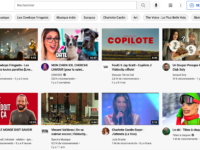My series on Bill C-11’s foundational faults has covered jurisdictional over-reach, the implications of treating all audio-visual content as a “program” subject to CRTC regulation, as well as the flaws and harms of the discoverability provisions. While the faults thus far focus on provisions contained in the bill, this post examines a critical aspect of broadcast and cultural policy that the government has failed to address. The bill purports to support “Canadian stories” but the current system often means that certified Cancon has little to do with Canada and fails to meet those objectives. Case in point: the certification of Gotta Love Trump, a film primarily comprised of pro-Trump clips that include Trump’s photographer, a former Apprentice contestant, Roger Stone, Candace Owens, and a cast of others with scarcely anything resembling Canadian content.
News
Bill C-11’s Foundational Faults, Part Four: Why the Discoverability Rules Will Harm Canadian Creators and Risk Millions in Revenues
My post on why Bill C-11’s discoverability rules are a flawed solution in search of a problem demonstrated that there is little incentive for Internet platforms to make it difficult for Canadians to find Canadian content. Indeed, experience with both Netflix and Youtube suggest that there is every reason to ensure the availability of such content and to recommend it where users show an interest. Yet proponents of discoverability regulations may still argue that even if they are unlikely to accomplish much, what is the harm in trying? The simple answer is that the regulated discoverability requirements are likely to harm Canadian creators, resulting in lost audiences and potentially millions in lost revenues.
Bill C-11’s Foundational Faults, Part Three: Why the Discoverability Rules Are a Flawed Solution in Search of a Problem
My prior posts on the foundational faults in Bill C-11 focused on the virtually limitless reach of the CRTC’s jurisdictional power over audio-visual services and the risks of treating all audio-visual content as a “program” subject to potential regulation. This post – the first of two on the subject – explains why the discoverability rules that purport to better promote Canadian content are a flawed solution in search of problem that will actually make things worse for Canadian creators.
The discoverability provision, which grants the CRTC the power to establish discoverability requirements as a condition on Internet services, states at Section 9.1(1):
The CRTC Provides an Advance Preview of Bill C-11 Regulation: Pretty Much Any Service, Anywhere, Any Terms and Conditions
The Canadian Radio-television and Telecommunications Commission issued a notable decision last month involving the creation of an annual digital media survey that likely provides an advance preview of how it will address Bill C-11 if it becomes law. That is a cause for concern, since the Commission apparently sees few limitations in its powers despite obvious doubts that it is operating within the boundaries of existing law. Those powers, which will be increased should Bill C-11 be enacted, lead to its position that any broadcasting from anywhere in the world is subject to its jurisdiction so long as there is a Canadian nexus to the activities. There is no requirement that the service be located in Canada in order to qualify and little practical guidance on what constitutes a Canadian nexus.
CRTC Calls for Increased Powers To Take a More “Interventionist” Approach on Internet Content
Last month, I appeared before the Senate Standing Committee on Legal and Constitutional Affairs to discuss Bill S-210, a bill that aims to limit minors’ access to pornography sites by implementing age verification and website blocking requirements. I warned that face recognition technologies, which are often used for age verification, raise serious privacy risks and that website blocking would have negative consequences for freedom of expression. Further, I emphasized how incredibly broadly the bill is drafted. While the Senators were focused on some well-known pornography sites, widely used sites and services such as Twitter or Reddit are also captured by the bill, raising the possibility of age verification to send a tweet or read a Reddit post.
The committee’s study of the bill continued yesterday with an appearance by Scott Hutton, the CRTC’s Chief of Consumer, Research and Communications. While Hutton emphasized there were no easy answers and that net neutrality principles would likely preclude action with respect to content regulation under the Telecommunications Act, his responses to some Senators reinforce concerns that should Bill C-11 pass, the Commission will be in the Internet content regulation business through the Broadcasting Act. Indeed, while Canadian Heritage Minister Pablo Rodriguez and the CRTC have sought to downplay concerns that the CRTC would seek to regulate online content, Hutton told the committee the Commission needs more power in order to adopt a more interventionist approach:











